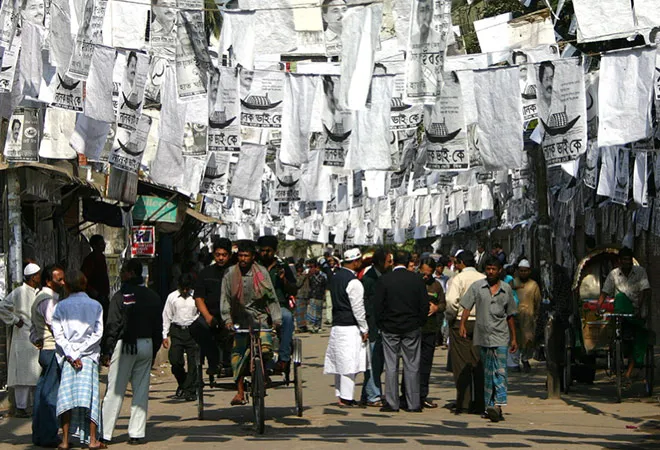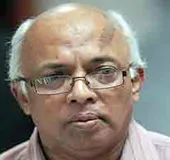
Election temperature is rising in Bangladesh. And with that has come quite a few unexpected surprises. What initially looked like a concerted move to cobble an anti-government political alliance in order to mount a challenge to the ruling Awami League does not appear to have had any impact, at least not till now. A good reason behind the failure by former Foreign Minister Kamal Hossain and former President A.Q.M. Badruddoza Chowdhury coming together on a single platform has foundered on the old issue of whether or not the opposition Bangladesh Nationalist Party, out of power for 12 years and out of parliament for five, is willing to walk out of its marriage with the Jamaat-e-Islami. The Jamaat, now de-registered as a political party, remains guilty of murderous collaboration with the Pakistan occupation army during the Bangladesh’s war of liberation in 1971. Several of its leaders, convicted of war crimes by special tribunals, have gone to the gallows in recent years.
The irony of the situation is inescapable. Chowdhury, a founding member of the BNP who has served as a minister and was elected Bangladesh’s president in 2001 before being turfed out by his own party, demanded as a condition for the BNP to be part of the projected alliance its public divorce from the Jamaat, with which it has been in alliance since the elections of 2001. At the other end, Dr. Kamal Hossain, an eminent lawyer who served as minister for law and then as minister for foreign affairs in the government of Bangladesh’s founder Sheikh Mujibur Rahman in the 1970s and was later instrumental in having Sheikh Hasina assume charge of the Awami League in 1981, quite happily welcomed the BNP on board his Jatiyo Oikyo Front, or National Unity Front, no questions asked.
Badruddoza Chowdhury, who has been at the helm of his Bikalpadhara (Alternative Stream) organization, has thus kept himself out of the alliance which he and Hossain had with much fanfare promised the country. And with Kamal Hossain, whose Gano Forum (People’s Forum) has not made much of an impact in Bangladesh’s politics, in the Chowdhury-minus alliance are men whose standing in national politics has been relatively minor. Mahmudur Rahman Manna, once a leading light in the leftwing Jatiyo Samajtantrik Dal (JSD) before switching his loyalties to the Awami League which he was eventually to leave, has had a recent spell in prison. A.S.M. Abdur Rab, a former student leader instrumental in the formation of the JSD, is best known for his association with the executed Col. Abu Taher in the counter-coup which brought General Ziaur Rahman to power in November 1975. Rab later served as leader of a loyal parliamentary opposition in the times of Bangladesh’s second military ruler, General H.M. Ershad, before linking up with the Awami League in 1996, when he found a berth in the Awami League-led government as minister for shipping. In recent years, his stock has declined to rock bottom.
There are others with Kamal Hossain on the unity stage, of course. But certainly the most significant part of the alliance Hossain leads is the accommodation of the BNP in it. In effect, the invitation to the BNP to join the anti-Awami League alliance was a godsend for the party considering the many miseries it has lately been going through. Its chairperson and former Prime Minister Khaleda Zia and her son and heir-apparent Tareq Zia have been convicted on charges of graft. The Begum is in prison in Dhaka, while the son has been in exile in London since he was compelled to leave the country by the last military-backed caretaker government in 2007. And that is not the end of the BNP’s troubles. Only last week, a speedy tribunal convicted a number of BNP men and others of planning and executing a conspiracy to wipe out the leadership of the Awami League through a series of grenade explosions on 21 August 2004. The BNP, in power with the Jamaat-e-Islami at the time, failed to carry out a meaningful investigation and indeed countered charges of its role in the tragedy by suggesting that Sheikh Hasina and the Awami League had themselves orchestrated the blasts. Last week’s judgment handed down capital punishment to a number of individuals, prominent among whom was the former minister of state for home Lutfozzaman Babar. Several others, including former senior police officers, were sentenced to various terms in prison. The exiled Tareq Zia was slapped with a 17-year term in jail.
It was thus a decapitated BNP which had life breathed into it afresh through being invited to join Kamal Hossain’s unity bandwagon. The BNP had been demanding over the last few years the formation of a caretaker or interim government to oversee the next general election, which demand the ruling Awami League has rejected out of hand on the premise that the constitution has no provision for such a pre-election administration. The Awami League, it will be recalled, speedily went into an abrogation of the caretaker concept by ramming the fifteenth amendment to the constitution through in parliament when it rode back to power in early 2009. On the unity stage, however, one of the key demands placed before the government related to the setting up of an interim administration before the elections. It was certainly music for the BNP’s ears, though it produced a predictable response from the ruling party. Prime Minister Sheikh Hasina quickly came down hard on Kamal Hossain, her erstwhile colleague, accusing him of joining hands with murderers by linking up with the BNP.
The tenuous nature of the unity alliance should not be making the ruling Awami League happy beyond measure, though. As it prepares for the election, the party has a plateful of issues it needs to handle with dexterity but has not so far. Reactive politics could turn out to be its enemy, given the indignation with which it has responded to such developments as the revelations made by former Chief Justice Surendra Kumar Sinha in his recently released book, A Broken Dream. Sinha, the first Hindu chief justice of Bangladesh now in the US after he was forced to leave the country --- he subsequently sent his resignation from abroad --- has been less than complimentary about the prime minister and her government.
Away in the corner lurk other issues the government is burdened with. The journalists’ community is up in arms against the recently promulgated Digital Security Act, which is a clear threat to free media expression in the country despite the government’s reassurances that journalists have nothing to fear. Recent disappearances of citizens are a problem the government has not handled to public satisfaction. And let us not forget that the Rohingya problem continues to be a burden that does not promise to lift anytime soon. The threat arising out of the announcement of a National Register of Citizens (NRC) in the neighbouring Indian state of Assam relating to 4,000,000 people the Assam authorities believe are illegal Bangladeshi migrants looms large.
These are difficult yet exciting times in Bangladesh. The risks posed to politics ought not to be minimised, though.
The views expressed above belong to the author(s). ORF research and analyses now available on Telegram! Click here to access our curated content — blogs, longforms and interviews.




 PREV
PREV


